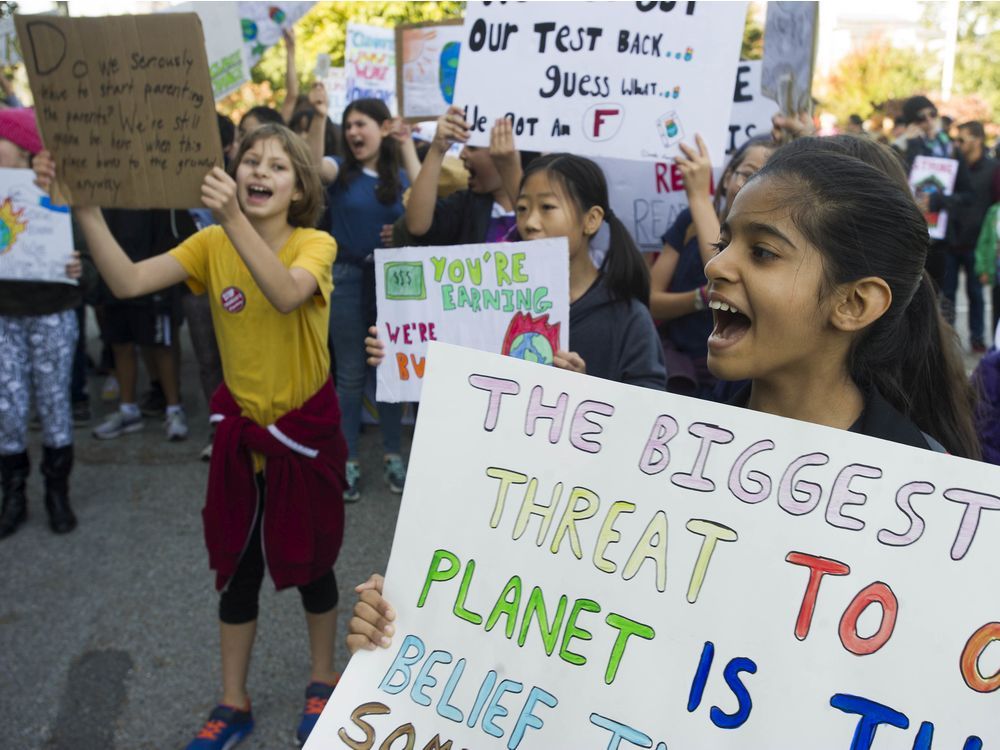Youth to sue Canadian government for climate change harms, discrimination

Credit to Author: The Canadian Press| Date: Thu, 24 Oct 2019 19:47:10 +0000
VANCOUVER — A lawsuit that’s expected to be filed Friday claiming young people disproportionately suffer the effects of climate change is potentially precedent setting but also a tough case to argue, legal experts say.
The David Suzuki Foundation, which is acting as a partner in the case, outlined in a news release the general arguments in the case being filed by 15 youths who allege they have suffered “specific” injuries due to climate change.
It calls on Ottawa to stop conduct that violates their charter rights and to implement a plan that reduces Canada’s greenhouse gas emissions “in a manner consistent with what best available science indicates is needed for the federal government to protect young Canadians, do its fair share to stabilize the climate system, and avert the catastrophic consequences of climate change.”
The news release does not explain the injuries and no one involved in the lawsuit would comment before it is filed with the Federal Court.
None of the claims made by those arguing a violation of their charter rights have been tested in court.
Canada’s attorney general has not responded to a request for comment.
Maureen Killoran, a litigator at Osler law firm with expertise in energy and resource law, said the suit is part of a global trend but only a case in the Netherlands has been successful in holding a government responsible for its domestic contributions to global greenhouse gas emissions.
In that case brought by the environmental group Urgenda on behalf of 900 Dutch citizens, an appeals court last year upheld a landmark ruling that ordered the Dutch government to cut the country’s greenhouse gas emissions by at least 25 per cent by 2020 from benchmark 1990 levels.
The court said the government is under a legal obligation to take measures to protect its citizens against climate change after failing to meet its own targets.
Tens of thousands of people concerned about the state of the earth’s climate converged on Vancouver city hall Friday, September 27, 2019 as part of a global initiative to bring attention to the environment. The throngs of people marched across the Cambie Street bridge and into downtown.
“Considering the great dangers that are likely to occur, more ambitious measures have to be taken in the short term to reduce greenhouse gas emissions in order to protect the life and family life of citizens in the Netherlands,” the court said in a statement.
Killoran said several jurisdictions have modelled lawsuits after the Dutch case.
In Quebec, an environmental group sought to launch a class-action lawsuit against the federal government almost a year ago for what it said was a failure to combat climate change. Lawyers argued Quebecers 35 and under are being deprived of a right to a healthy environment and will suffer the effects of global warming more than older generations.
In July, Superior Court Justice Gary Morrison said the cause of environmental protection was of undoubted importance. But he said members of the class would have to be 18 or older, and excluding those over 35 appeared to be a “purely subjective and arbitrary choice” by the organization.
Killoran said it’s notable that the court struck down the case based on its definition of the class, rather than the legal argument it sought to make.
“They failed, but they didn’t fail because the court said it wasn’t judiciable. Meaning the court said, ‘Yeah, I think you can sue the government for something like this,’ but the court took issue with the definition of the class,” she said.
Lorraine Weinrib, a constitutional law professor at the University of Toronto, said the case being filed at the Federal Court could have an interesting argument if all of the youths are minors.
“Under the equality clause, which is one of the elements being argued, the court pays attention to people who are politically powerless. And, of course, young people can’t vote,” she said.
The equality rights argument could also be successful, she said, because there is an understanding that government can’t intentionally or by effect act in a way that disadvantages people who are already disadvantaged, such as people without voting rights.
But lawyers will face a major hurdle in compelling Ottawa to implement higher cuts to greenhouse gases, she said.
It’s more common for lawyers to win charter arguments that require the government to refrain from acting in a certain way, Weinrib said.
“The original design of the charter by prime minister Pierre Trudeau was to include some positive rights and to obligate certain kinds of distribution of wealth but that didn’t survive to the final negotiation.”
Under Canada’s democratic system, those kinds of “positive duties” or actions are traditionally achieved in the political realm through party platforms rather than court orders, which makes it interesting to see it appear in this case, she said.
“This is a legal proceeding that isn’t likely to be successful in terms of securing a victory on the legal submissions that are being made, but I think that it will be a very, very important case to bring the facts and the arguments to a different forum,” Weinrib said.
She said the team behind the young plaintiffs is robust and includes, among others, the law firm of Joseph Arvay, one of Canada’s leading constitutional lawyers.
Our Children’s Trust, which launched a similar case against the United States government, is providing technical support.
“This will be very sophisticated litigation,” she said.